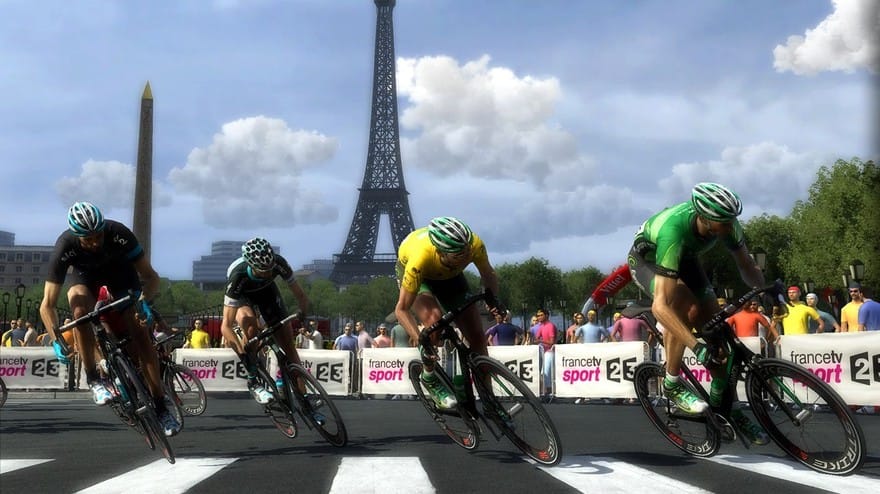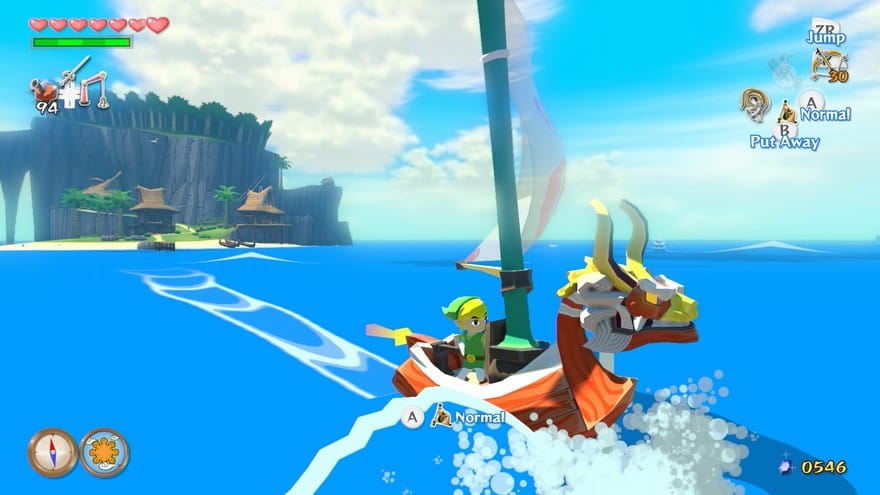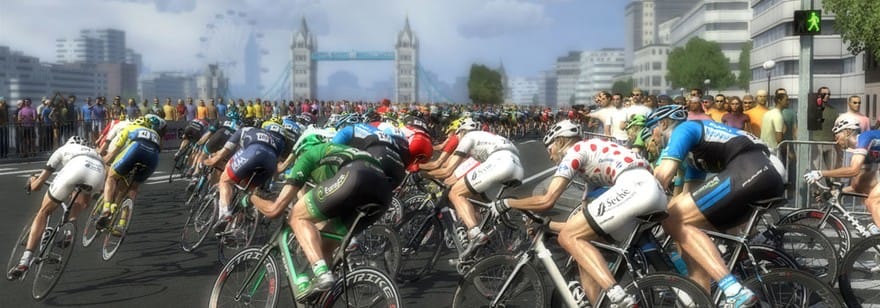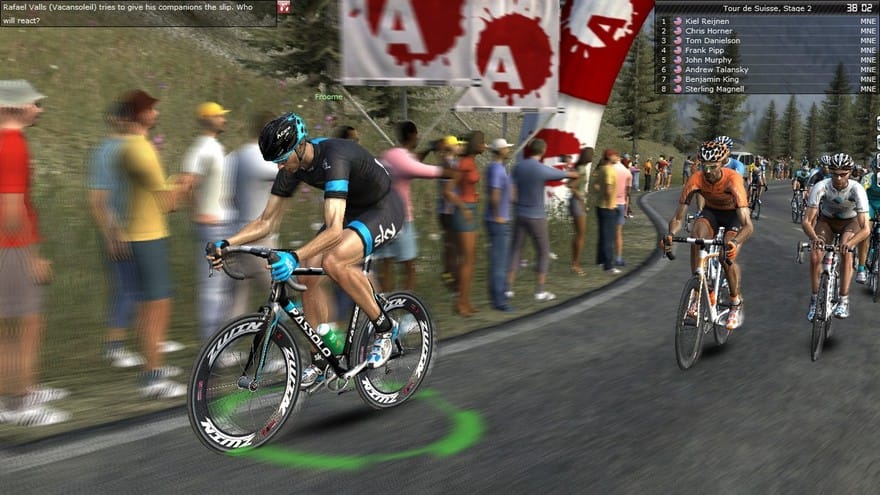The sublime pleasure and pain of cycling and games about cycling

It’s been about two years since cycling changed everything for me. I don’t just mean that I entered an obsessive phase, though that’s also true. Cycling has become a point of reference from which I reconsider daily life. It affects how I eat, dress, and how much time I spend with loved ones. Cycling makes me think about my body, and other people’s bodies, and what they’re for, and how we build our cities to accommodate those bodies and what they’re for. Cycling changed the way I vote and how I invest my money. When I visit distant and quasi-exotic places best known for their cuisine and art I’m instead interested in the grades of their hills and the presence or lack thereof of wide and accommodating shoulders on their roads. I wear tight and padded shorts often, and miss their reassuring support when I don’t.
Cycling empowers.
It’s not an exaggeration to say that cycling, for me, has been of the same significance as a spiritual or political epiphany. Cycling represents feelings and ideas beyond my control, forces and industries preceding and greater than me. It’s the interface through which I navigate the world. Cycling empowers.
I know how overblown this sounds to most, as all subjects of intense devotion must be to non-believers. I’ve never felt this way about, say, running, which has always felt a little bit like being mugged inside of a clothes dryer. All the more surprising, then, that cycling would not only be more enjoyable for me than running, but would provide the sensation of profound chemical conversion. After cycling I’m on a cloud for hours. After running I quit running.

I’m enabled by government money. I live in a national capitol, with hundreds of kilometers of scenic roads that are perfect for cycling—through provincial parks and over waterways and past heritage buildings like riverfront sentries. What makes this obsession tragic is that my city is also in a part of the world that tends to be bitterly cold and buried under snow for months at a time, barring those perfect riding roads from access on dainty road bicycles.
And winter is here. I am an addict in search of a substitute drug. I’m in need of the perfect cycling simulator.
///
Ok, so the obvious: it’s probably unreasonable to expect a sedentary activity like playing a videogame to capture the ephemeral pleasures of rigorous motion. But how, and why, is it unreasonable? Can it be true, in this age of intuitive design and meta-design, that games are simply static and sports are simply not? Or am I assuming too much? What is it, exactly, that I want simulating?
I’m in need of the perfect cycling simulator.
To partake in endurance sports, and cycling especially, seems to be a sadomasochistic or Zen-like exercise in perseverance in the face of pain and wear. Sports video games, or at least the cycling games I played, seem uninterested in duplicating these psychological aspects, in exploring the animalistic state to which an otherwise sophisticated person is reduced by hours spent grinding one’s way up hills. You may be able to simulate the experience of speed, or the adrenaline rush of a near-collision, or the tedium of strategic planning, but it’s difficult to simulate not just the experience but the mental fortitude required to engage in an activity that often results in open, weeping sores on your ass.
What I’m seeking in a cycling simulator, then, is the paradox of converting effort into accessibility without losing what it means to have lived through effort. I don’t know how this is possible.

You could argue that there are many non-sports games that more closely reflect the skin-of-your-teeth desperation and relentless brutality of endurance sports. Survival horror games like The Last of Us or Resident Evil feel more like a marathon than a sprint; game maker Pippin Barr creates crushingly difficult games where winning conditions are literally impossible to achieve; the Dark Souls franchise has made its name on being uncompromisingly difficult; Kane & Lynch and Max Payne 3 married their aesthetic design to the physical experience of pain and anxiety; Shadow of the Colossus or The Legend of Zelda: the Wind Waker featured sprawling, often empty-feeling landscapes and long, lonely bouts of travel, unknowingly mirroring the solitude and psychic rigors of endurance sports.
Humor me, though: what would a cycling game that accurately captured the mental and physical trials of endurance cycling look like? A cartoony, Mario Kart-esque racer, complete with power-ups and banana peels and exaggerated crashes (see also: Paperboy, the original arcade cycling simulator)? A manager tool, where resource-supervision and incremental equipment upgrades edge you towards competitiveness? A showcase for the graphical prowess of next-gen systems, taking the weather-dependent logistical nightmare that is filming a moving event and removing half of the variables to show only the more spectacular vistas of continental Europe?
I’m looking for verisimilitude.
While each of the above scenarios might make excellent games in their own right, each would have only coincidental allusions to what I love about cycling, would seem to point, resignedly, to the dry facts of cycling’s existence. I’m looking for verisimilitude, that chemical conversion, that other thing to which I can turn to when it’s February and I have a beard down to my knees.
///
To unlock the subtler appeal of endurance sports means taking the time to experience one of its events from beginning to end, for in so doing one understands why the term endurance is required. Watch any five minutes of a marathon and you have none of the context that makes a marathon a marathon. Watch all of a marathon and you can imagine how the physical exhaustion caused by your intense concentration on the television would be magnified several-fold for its runners.
Perhaps this is why the Pro Cycling Manager franchise is built, conceptually and spiritually, around the Tour de France, pro cycling’s signature event, which runs for 21 days in July, and is the equivalent of several marathons in a row.
To appreciate the Tour de France is to contemplate its patent insanity. Its route travels through the Pyrenees and Alps on ascending grades that can only be described as torturous, and over cobblestone streets that pummel the spines of riders with repetitive shocks. Before the era of comfortable bikes and scientific training, cyclists would sprint into bars along the route and drink as much alcohol as they could to dull the pain. At least 93 professional riders have died on the circuit in various crashes and accidents between 1894 and 2013. On this year’s Tour, Alberto Contador crashed his bike, broke his leg, then took his teammate’s bike and road with a broken leg for nine miles before finally giving up. The break, later revealed to be a fractured tibia, required surgery.
The Tour de France is not a place for reason or logic.
I’m not cherry picking the most sensational events, either. Contador’s crash was only one of about 23 major incidents that year. This on a tour in which tour vehicles share the road with riders, sometimes resulting in car-on-cyclist accidents, and an event in which the hundreds and hundreds of kilometers make meaningful separation of cyclist and spectator impossible. The Tour de France is not a place for reason or logic; it’s both an extreme example and utter distillation of the experience I hope any serious cycling simulator will seek to capture. The Tour de France is spectacle, yes, but also an absurd and vital contrast of hellish human suffering and obscenely beautiful European landscape that allows for meditation on the nature of both human achievement and insignificance in an uncaring and unknowing natural world.
///
So, yes, my expectations are ridiculous, and no, Pro Cycling Manager Season 2014: Le Tour de France does not bridge the experiences of systematically testing the boundaries of game design and one’s own humanity. Its developers seem stumped—as, to be fair, am I—about how to replicate the grind of cycling beyond what amounts to a series of quick-time events or asking that you mash a button as fast as you can repeatedly. While it has its moments of graphical precision, there is something disparaging about the fact that we have not come all that much further than the NES Power Pad crossed with an Excel spread sheet.

The game consists mostly of 3D simulation. You attempt to control the conditions for your team, and then you watch, keeping track of your cyclists’ diminishing stamina. It’s difficult to get good at, and almost impossible to enjoy.
I think that part of the problem is that the game lacks much feedback for the player; the moment when you instruct your cyclist to attack, it’s unclear whether anything is happening at all. You watch as your team chugs along like marionettes, alongside the other teams, with effortless repetition. The interface is complicated, often non-intuitive, and you rarely understand the results of your decisions. Your only indicators of whether your team is broaching the gulf between mortal man and immortal transcendence are a series of runic acronyms symbolizing … well, I’m not sure.
The irony is that the amount of time I spent in this game simply watching what amounts to 20 minute cut scenes reinforces the cycling-less reality of my wintery life—precisely the reality I am trying to avoid by seeking out a simulator. In my attempt to find the ideal replacement for real world cycling, I was only made more aware of the loss of real world cycling in my life.
It’s difficult to get good at, and almost impossible to enjoy.
The game does a reasonably good job of simulating the strategy of team cycling—insulating your sprinters or climbers from wind resistance, controlling pace to preserve energy, and, most of the time, watching as your riders fall behind. That is, until your team develops attributes, if you possess the patience required or are willing to tweak the speed of attribution in the options menu, a technique also known as “cheating,” and of which I happily availed myself.
It’s not all bad. All of the freakishly random elements attendant a chaotic event—tire punctures on cobblestone, weather changes, a sudden sickness, tweaks to equipment—are included. You are occasionally subjected to the capricious and random nature of outdoor competition, which felt real. You can even feed your riders an energy gel, which, in a game with so little to actually do, takes on the symbolic importance of storming the Reichstag. But ultimately, Pro Cycling Manager is closer to a fixed-rail shooter without the shooting. You’ll be tempted to test the boundaries of the game world—can you set off, away from the peloton and through this charming countryside town? Did the programmers place a bakery or church just off the route? Can I ride as fast as I can into the crowd, and if so how realistic are the crowd injury animations? The answer, of course, is that you can do none of these things. The game glues you to the Tour’s inexorable and scenic track, as if you reassert that the televisual and the physical must remain forever apart, alien worlds of paradigmatic difference.

The game is even missing collision detection, so that riders phase in and out and through one another like ethereal representations of cyclists (which, of course, they are). The physical is eliminated altogether. The shadow of cycling—its ghost—flickers prettily on a wall.
///
If I were trying to be cute, I’d say that Pro Cycling Manager has unlocked ‘tedium’ on the spectrum of simulated endurance. But it’s almost December, and there’s snow on the ground, and my bicycle is sitting, wheels up in my den, a symbol of my inverted world. Maybe we’ll have to wait until VR arrives, when a cycling simulator might come packaged with diodes to hook up to your body that stimulate your muscles so that you experience fatigue and strain. Maybe the best we can hope for are those spin classes with televisions playing loops of famous cycling courses. Maybe what I’m describing are cheap experiments for niche markets and I just need to find a winter sport that I enjoy. I hear cross-country skiing is nice.
Until then, Pro Cycling Manager Season 2014: Le Tour de France is not the answer. It remains a fascinating contradiction pointing to a dilemma at the center of gaming: an Apollonian approximation of Dionysian ecstasy, a figure, in a spreadsheet, representing the unknowable. Videogames like this one invite me into their world, but they don’t seem to know what my world is like.



